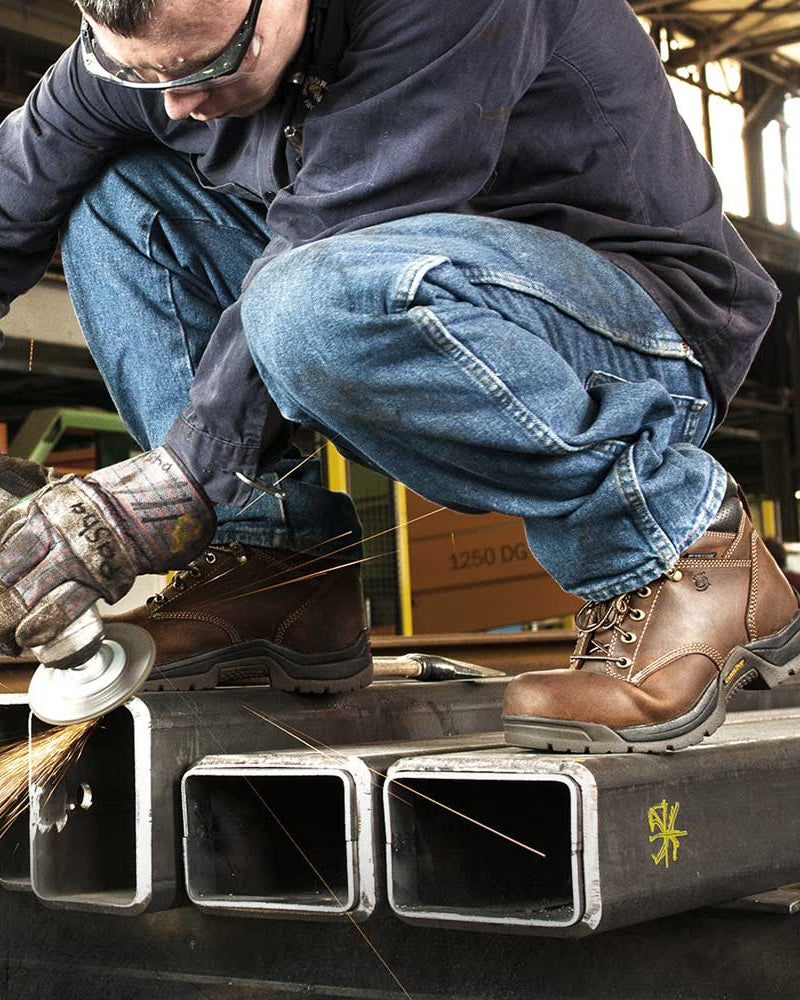
Congratulations! You just got the job you wanted but it requires a work boot. How do you know which work boot to buy for the job?
Here are the first three items to consider to help you determine which boot is right for you.
- First, ask your employer if there is a specified boot that is required for the job. If so what are the specifications?
- If there are no specified boots, determine if the job is likely to have falling objects or machinery that could crush your toes by falling or rolling over your toes, and if you will entering and exiting security areas with metal detectors often.
- If neither of the above apply, determine if a heavier or lighter boot will be more comfortable in your working situation.
If you answered yes to item 1, just give the specifications to your online shoe store or take them with you to the work boot brick and mortar store. More information about work boot toe specifications can be found on our work boot specification blog post.
If you answered yes to item 2, you probably will need a steel toe or alloy toe work boot, but a strong composite material might also be sufficient, especially in security areas with metal detectors. Check for work boots online to get more information.
If in item 3 you determine that a lighter boot will be safe for your work site, check out the Composite Toe boots or Alloy Toe work boots online.
Here are some additional pros and cons to consider when buying your work boots.
Steel Toe Workboots
The classic work boot is the steel toe configuration. Steel Toe Boots are the standard when it comes to protecting your feet on the jobsite. When shopping for the best steel toe boot, or any work boot, it is important to look for one that includes a steel shank. A steel shank is a flat piece of material that is inserted into boots below the arch, between the heel and ball area of the foot. A steel shank serves the purpose of adding safety, comfort and longevity to your boots, while helping to maintain their overall shape.
.The Pros: These tend to be less expensive. You get maximum protection from heavy falling objects and equipment like chainsaws and grinders.
The Cons: They can be overly heavy and uncomfortable with a smaller toe box and they also set off metal detectors like the alloy toe.
You can see all of our steel toe work boots at this site.
ALLOY TOE WORK BOOTS
Alloy toes are probably our most popular safety toe. They're made from lightweight materials like aluminum and titanium, but they're as strong as steel. Our customers sometimes are looking for an alloy toe shoe for work with the comfort of an athletic shoe, in that case look no further than the Work Boot Reebok Sublite for men and women.
How do alloy toe work shoes compare to its steel toe counterpart? Alloy toe shoes and boots are made of titanium, aluminum, or a combination of other various materials which make them 30-50% lighter than steel toe footwear and provide more toe room. Here is a great selection of alloy toe work boots.
The Pros: Alloy toes can be up to 50% lighter than steel. It's made thinner, so you get some more room in the toe box.
The Cons: These can run more expensive in some circumstances, but you may find that it is worth it for the comfort and safety features. They do set off metal detectors, so if you have to go in and out of secured areas often, that can become an inconvenience.
COMPOSITE TOE WORK BOOTS
Composites are great if you are looking for a more moderate level of protection. They still pass all the standards, but might not be rated for as much weight as a steel or alloy toe. Composite Toe boots are another great option when it comes to protective footwear that gets the job done. Composite toe boots have three major benefits over their steel toe counterpart: lighter weight, they don't set off metal detectors and they hold in heat better when working in a cold environment. If you are not required by your employer to wear steel toe boots and work around electricity or out in the elements, composite toe boots will get the job done and be a more comfortable option for all-day wear. Check out our Composite toe work boots!
The Pros: If you are working in extreme high or low temperatures they are more comfortable as they won't heat up or cool down like a metal toe would. They're 30% or more lighter than steel toes.
The Cons: They can't take as much impact or compression as a steel or alloy toe. They pass standards, but make sure that they fit the standards for the job you are doing.
Figuring out what kind of toe you need really depends on the job you've got to do. Just give us a call at GB Shoes or Housershoes.com if you need help finding the right one for you.









